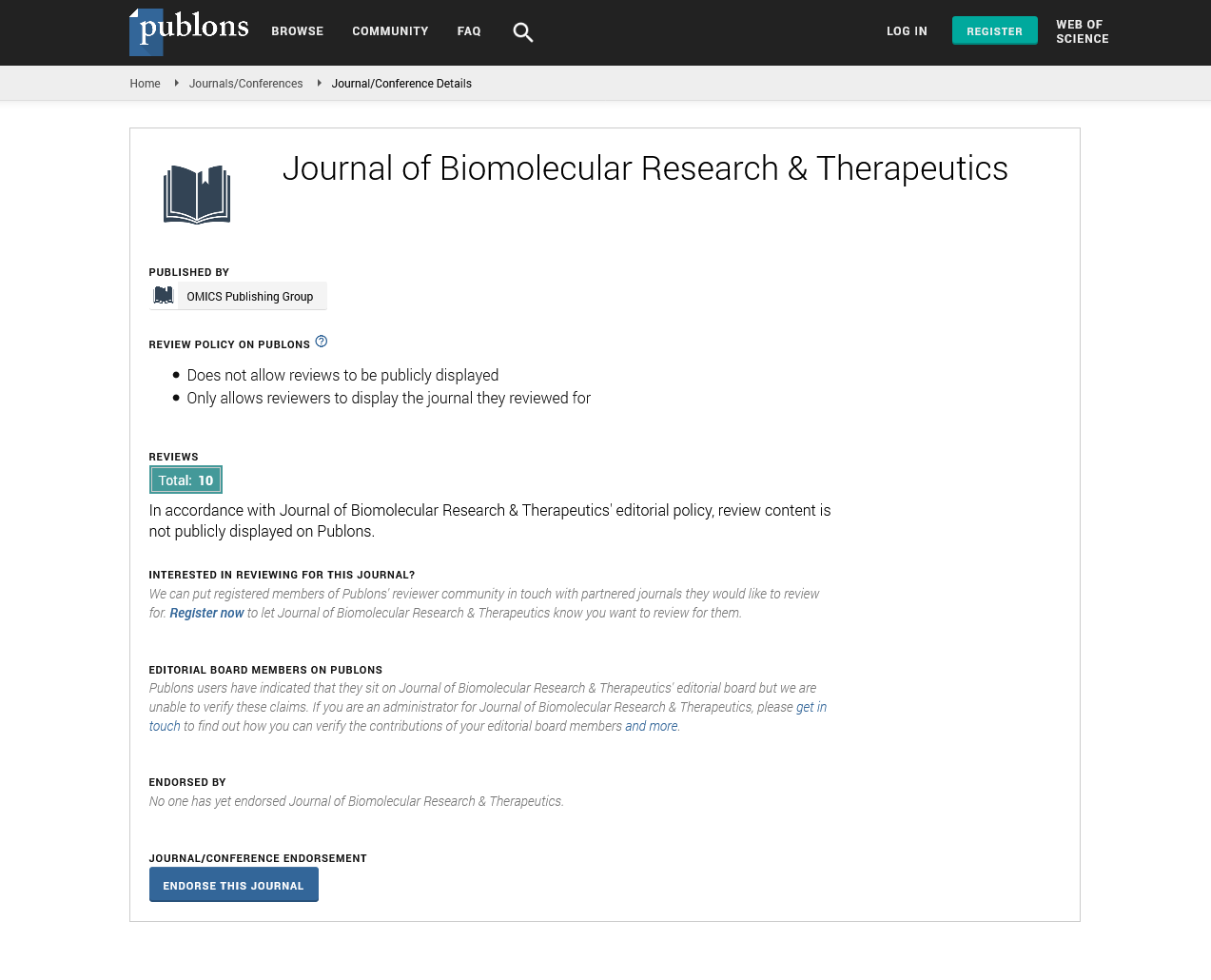Indexed In
- Open J Gate
- Genamics JournalSeek
- ResearchBible
- Electronic Journals Library
- RefSeek
- Hamdard University
- EBSCO A-Z
- OCLC- WorldCat
- SWB online catalog
- Virtual Library of Biology (vifabio)
- Publons
- Euro Pub
- Google Scholar
Useful Links
Share This Page
Journal Flyer

Open Access Journals
- Agri and Aquaculture
- Biochemistry
- Bioinformatics & Systems Biology
- Business & Management
- Chemistry
- Clinical Sciences
- Engineering
- Food & Nutrition
- General Science
- Genetics & Molecular Biology
- Immunology & Microbiology
- Medical Sciences
- Neuroscience & Psychology
- Nursing & Health Care
- Pharmaceutical Sciences
Commentary Article - (2024) Volume 13, Issue 3
Using Synthetic Biology in Medicine to Create Personalised Treatments and Diagnostic Instruments
Zhuang Liang*Received: 03-Jun-2024, Manuscript No. BOM-24-26507 ; Editor assigned: 05-Jun-2024, Pre QC No. BOM-24-26507 (PQ); Reviewed: 19-Jun-2024, QC No. BOM-24-26507 ; Revised: 26-Jun-2024, Manuscript No. BOM-24-26507 (R); Published: 03-Jul-2024, DOI: 10.35248/2167-7956.24.13.389
Description
Synthetic biology represents a transformative approach to medicine, where biological systems are engineered to create new functions and capabilities. This multidisciplinary field combines principles from biology, engineering, computer science, and chemistry to design and construct new biological parts, devices, and systems. In medicine, synthetic biology holds the potential to revolutionize diagnostics and therapeutics, offering innovative solutions for some of the most challenging health problems.
Gene and cell therapy
Gene therapy involves introducing, removing, or altering genetic material within a patient’s cells to treat or prevent disease. Synthetic biology enhances gene therapy by enabling the design of synthetic gene circuits that can regulate the expression of therapeutic genes in response to specific signals. For example, synthetic promoters can be designed to activate gene expression only in the presence of disease markers, reducing the risk of off- target effects.
Cell therapy, particularly using engineered T cells, is another area where synthetic biology is making significant strides. Chimeric Antigen Receptor (CAR) T-cell therapy, where T cells are engineered to express synthetic receptors that target cancer cells, has shown remarkable success in treating certain types of blood cancers. Synthetic biology enables the design of more sophisticated CAR constructs that can improve the efficacy and safety of these therapies.
Microbial therapeutics
Engineered microbes are being developed as living therapeutics to treat a range of diseases. Synthetic biology allows for the precise control of microbial functions, enabling the creation of bacteria that can produce therapeutic molecules in situ, sense and respond to disease markers, or modulate the host immune system. For example, engineered probiotics are being developed to treat gastrointestinal diseases, metabolic disorders, and even neurological conditions.
Protein and peptide therapeutics
Synthetic biology also facilitates the design of novel proteins and peptides with therapeutic potential. By manipulating protein-coding sequences and using techniques like directed evolution, researchers can create proteins with enhanced or novel functions. These engineered proteins can be used as drugs themselves or as components of more complex therapeutic systems.
Diagnostic tools powered by synthetic biology
In addition to therapeutics, synthetic biology is revolutionizing diagnostics by enabling the development of highly sensitive and specific tools for disease detection and monitoring.
Biosensors: Synthetic biology-based biosensors are designed to detect specific biological molecules or environmental signals. These biosensors can be used for early disease detection, monitoring disease progression, or assessing treatment efficacy. For instance, synthetic circuits can be designed to produce a detectable signal, such as fluorescence or color change, in the presence of disease markers like specific RNA sequences or proteins.
One exciting application is the development of paper-based diagnostics, which are low-cost, easy-to-use, and suitable for point-of-care testing. These diagnostics can be engineered to detect a wide range of conditions, from infectious diseases to cancer, and can provide rapid results without the need for specialized equipment.
CRISPR-based diagnostics: The CRISPR-Cas system, originally discovered as a bacterial immune mechanism, has been repurposed for diagnostic applications. CRISPR-based diagnostics, such as the SHERLOCK (Specific High-sensitivity Enzymatic Reporter unLOCKing) and DETECTR (DNA Endonuclease-Targeted CRISPR Trans Reporter) systems, use engineered Cas proteins to detect specific DNA or RNA sequences with high sensitivity and specificity. These systems can be used to diagnose infectious diseases, genetic disorders, and even cancer by detecting disease-specific nucleic acid sequences.
Wearable and implantable devices: Synthetic biology also enables the development of wearable and implantable diagnostic devices that can continuously monitor health parameters and provide real-time data. These devices can incorporate engineered cells or biosensors that detect changes in biomarkers, metabolites, or physiological conditions. For example, implantable glucose sensors using engineered bacteria can provide continuous monitoring of blood glucose levels in diabetic patients, allowing for better management of the condition.
Conclusion
Synthetic biology represents a effective tool for designing custom therapeutics and diagnostic tools, advanced for the treatment and diagnosis of a wide range of diseases. By harnessing the principles of engineering and the complexity of biology, synthetic biology has the potential to revolutionize medicine and improve human health in profound ways.
Citation: Liang Z (2024) Using Synthetic Biology in Medicine to Create Personalised Treatments and Diagnostic Instruments. J Biomol Res. 13.389.
Copyright: © 2024 Liang Z. This is an open-access article distributed under the terms of the Creative Commons Attribution License, which permits unrestricted use, distribution, and reproduction in any medium, provided the original author and source are credited.

